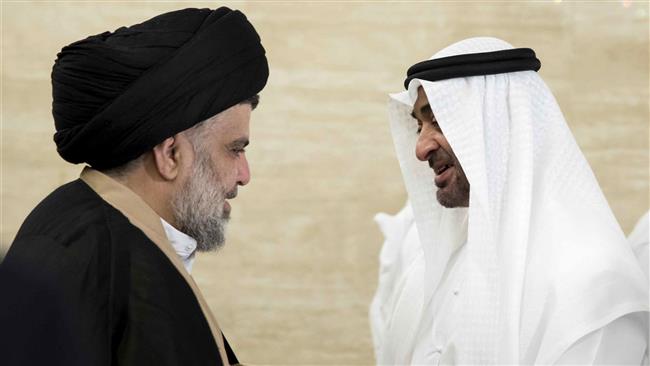
RNA - The Sunday visit was the second by Sadr to the Emirates in as many months, Emirati paper The National reported. The aircraft was to fly Sadr back to Iraq upon the conclusion of the trip.
He talked with Sheikh Mohammed bin Zayed, Abu Dhabi's crown prince, at a meeting also joined by Emirati Foreign Minister Sheikh Abdullah bin Zayed and other ranking officials.
The cleric met with Saudi Crown Prince and Defense Minister Mohammed bin Salman in the Saudi port city of Jeddah on July 30.
Sadr’s office said in a statement later that the Riyadh regime had agreed to pay Baghdad $10 million purportedly as aid to rebuild Iraq. According to London-based The New Arab news website, the Saudis also awarded special visas to members of Sadr’s office for this year’s Hajj pilgrimage.
Sadr, who enjoys a sizable grassroots following in Iraq, has been avowing views which clash with those of the central administration and, at points, even opting for direct opposition to the ruling authorities.
Last March, he started a sit-in inside Baghdad’s Green Zone to force the government to enact certain “reforms.” His supporters have also been holding several rallies in the Iraqi capital.
In April, he called on Syria’s President Bashar al-Assad to resign in the face of foreign-backed militancy, despite Baghdad’s refusal to take position on the conflict.
Also, after visiting Saudi Arabia, the cleric said Iraqi Prime Minister Haider al-Abadi had to either “integrate into the army the disciplined members” of the Hashd al-Sha'abi forces or put them under severe government control. Sadr had also called on Iraqi authorities to “seize the arsenal of all armed groups,” without elaborating further.
Hashd al-Sha'abi volunteers, who include Shia, Sunni, Christian and other members of the Iraqi society in their ranks, have been key to the country's recapture of cities and towns from Daesh terrorists in recent months.
Baghdad has integrated the fighters into its armed forces, and Abadi has categorically ruled out potential dismantling of the force.
847/940